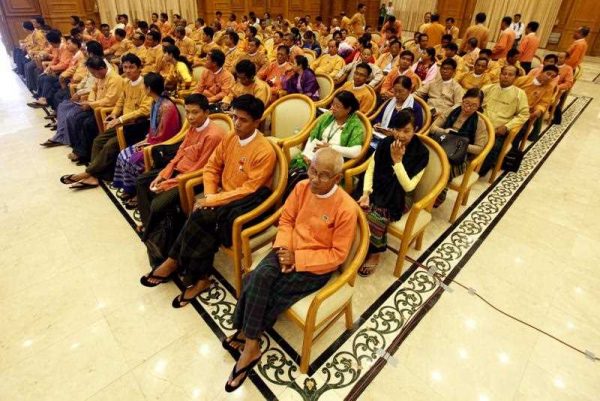There is now widespread acknowledgment that Aung San Suu Kyi will not be the president in this first stage of the transition of power. Section 59 (f) of the constitution bars Aung San Suu Kyi, the National Secretary of the NLD, from holding the presidency because her sons are not Myanmar citizens. Instead she declared she would be ‘above the president’, and plans to hold executive power while a symbolic president would take the nominal office.
The power of the new government will be curtailed by the parliamentary military bloc having control of the most important national ministries: interior, defence and border affairs. Beyond these procedural matters, Aung San Suu Kyi has tried to move cautiously and to present an inclusive face to the electorate. She has met with the military bloc and the ethnic minority party members, and seems very well aware of the need not to give the military an excuse to intervene in democratic processes.
While much attention has been focused on the question of the presidency and how power will be wielded under the new government, many other pressing concerns await the new administration. Among these are the need to raise the standard of living, the quality of education and the health status of the people, especially in rural areas; the need to protect the environment amid growing exploitation by resources companies; address egregious deficiencies in the judicial processes; and — perhaps most pressing of all — the need to build a peaceful multi-ethnic society.
Even one or two of these represent severe challenges to the governance skills and administrative experience of the NLD-led government, but an imperative to address all at once will prove a very challenging agenda. While work will commence on Myanmar’s renovation program, much will continue beyond the life of this parliament and into the next.
Foreign investment is bringing money into the country, roadworks and construction sites proliferate in Yangon, but the economy is weakening. Myanmar’s currency, the Kyat, has fallen in value and real poverty in rural areas has not begun to be addressed. In the central Myanmar dry zone, the results of a Yangon University pilot study into poverty alleviation, conducted in December 2015 in three areas, showed that 80 per cent of the people live below the poverty line of US$1 per day — significantly higher than the official government figures of only 27 per cent.
To increase family income, indigent parents take children as young as seven years old out of school to work at menial jobs. More than 50 per cent of primary school children do not go on to middle school and their functional literacy is questionable, limiting their employment opportunities.
An education reform bill has been stuck in the parliamentary processes since 2015. This is sure to be an important item on the new government’s agenda. Most universities are very poorly resourced, but do not want to integrate with Yangon University. Instead they prefer to keep their independence, but Aung San Suu Kyi is known to favour a constituent system with Yangon University at the centre. Political representatives in the regional areas where these universities have been established also do not want to see them lost for political reasons.
Seeking to be inclusive and to balance both regional and national interests will be a significant challenge to the incoming government on this front alone.
In the national elections the Arakan National Party (ANP), an extreme right-wing party, won a significant number of seats in Rakhine, the troubled state on the southeast littoral of Myanmar, which has been wracked by ethnic and communal violence since June 2012. The ANP’s ascendancy means that Aung San Suu Kyi’s options for bringing peace and development to that part of Myanmar are rather circumscribed. In the meantime, the dispossessed and disenfranchised Rohingya minority languishes in camps in appalling conditions.
In the north, the peace process has broken down in Shan State as Shan militia groups raid villages and kidnap children to undertake military training in their armies. The judiciary and law enforcement processes are still at the whim, and resources, of the most powerful.
To bring all of these issues to successful and productive conclusions in the process of building a peaceful, multi-ethnic civil society will be an ongoing challenge in Myanmar’s continued democratic evolution.
Helen James is Associate Professor at the Department of Anthropology, School of Culture History and Language, College of Asia Pacific, The Australian National University.

